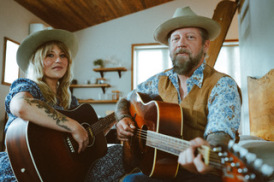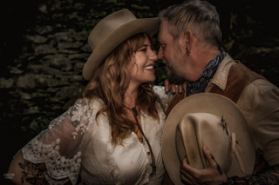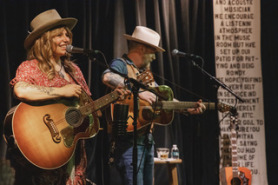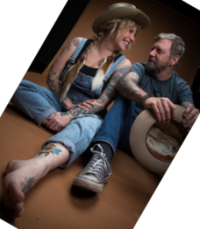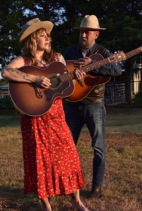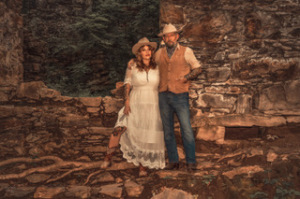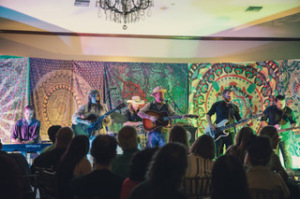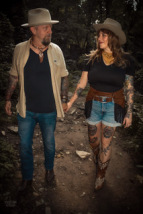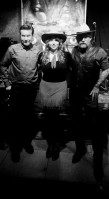
Talk with...The Waymores
photo by: Lyza Renee
I met with country-duo The Waymores during their European tour, and we sat down for a chat about traditional country music, their career and other topics. During this very casual interview Kira and Willie revealed quite a few anecdotes and seemed to have a lot of fun.
rockfrank: Kira, Willie: Thank you both for taking the time to answer a few questions for rockfrank.com. I do feel honored. Is this your first trip to Europe, e.g. Germany? What are your impressions so far?
Kira: We’re happy to be here! No, actually we did a tour in 2019, we came over and started in the UK with just the duo, and then we met the boys in the band and we took the tunnel over and came here and did like three, no, four weeks here.
Willie: Yeah, we did four weeks. We did two weeks in England, just us, and then the boys met us in Brighton, and we rehearsed, and got in the van, went through the tunnel and did four weeks in Europe. And oddly enough we played the same place here (in Cologne), the EDP. It’s my third time performing here, it’s been actually several times I’ve performed in Cologne, when my solo-career brought me here in about 2006. Yeah, I did some shows in my solo-career way before we started The Waymores. Oddly enough, we met right when I got home from that tour.
Kira: What a great day for you!
Willie: Yeah. What a great day (chuckles, so does Kira). But yes, I love Cologne, probably one of my favorite cities I’ve ever been to.
Kira: It’s beautiful.
Willie: I always get excited. We came straight into town today, went straight to the Cathedral, you know, it always takes my breath away. Every time I see it, it’s like the first time I’ve seen it.
rockfrank: Waymore also was a nickname for country-legend Waylon Jennings. Is the choice of your band name in reference to him? Is Waylon one of your idols?
Kira & Willie unisono: Yes, absolutely, one of our idols.
Kira: You’d be shocked, most people do not know that bit of information, so they don’t ask. They just say “Where did you get your name”, and then we have to explain that it was Waylon Jennings’ nickname. But that is 100 percent why we came up with it, because we love Waylon Jennings very much.
Willie: We both had solo-careers when we first met, and, you know, we were looking for something to do together. I’d go on tour and come home broke, and she would on tour and come home broke. And I was like, I can’t…. (do this anymore), you know, this is killing me. So, we were looking for something to do together. But because of my record label obligations I could not oversaturate my name, but just play in little bars, just to make some extra money. So, we started doing something together, and like I said, we couldn’t use the Willie Heath Neal name. And so, we were just looking for something to call it. And I said, let’s just call it The Waymores, and then we stuck with it.
Kira: I was a little bit tipsy when I agreed, I don’t care for the name very much. I wished that we had named it something else.
Sandra B: Like what?
Kira: I don’t know what it would be.
Willie: I had a name, but we can’t say it.
Kira: (laughing) No, absolutely not. We had a few ideas floating around. I guess, The Waymores fits us now, just because we’ve created a brand. But I still just don’t love it.
Willie: I still love, I still like it, I still stand by it. You know, we live in Atlanta, Georgia, in the States. And at first, I thought, let’s be The Atlanta Waymores, but then it was just The Waymores, and I still like it. I think it’s good. You know, it sounds like a couple’s name, like we’re Kira and Willie Waymore.
Kira: Yeah, lots of people think it’s our last name.
Willie: And we started looking, and thought for sure somebody had that trademarked, but it wasn’t. We trademarked it, we own it, we also own the domain. And then we ran across another band in Nashville that had the (same) name. And they were some pretty successful songwriters, three songwriters. They don’t tour, they don’t do anything, just playing around town. And one of these guys, and they had actually written a couple of songs for Waylon Jennings, he reached out once saying “You know, this is gonna be weird, if we ever tour…”. And I went “Well, it’s gonna be weird for you all, because we own the trademark and we own the domain, we have all the legal rights to ourselves” (both Kira and Willie are laughing). But they were really cool about it.
Sandra B.: Well, we love it. We love The Highwaymen.
Kira: Oh yeah, The Highwaymen, love them.
Willie: Yeah, I love it. Because, you know, it’s a subtle thing. And if you get it, you get it. And if you get it, that’s the kind of guy we want on our show. If you know that Waymore is Waylon Jennings’ nickname, then chances are, that’s the kind of person we want on our show. ‘Cause you know enough about the genre of music to know that.
Kira: Each time I tell Willie, that I don’t like the name, he reminds me, that I agreed to it.
Willie: You thought, it was great, right outside on the porch.
Kira: On the front porch of our house, sitting on the porch swing.
photo by: Velveteen Visions
photo by: Chad Edwards:
rockfrank: Since 2013 you perform as a country-duo, keeping up the traditional flag without feeding into the modern country-music. How important is it for you to kind of recollect, and focus on a more calm, traditional music, especially in these fast-paced times?
Kira: We didn’t really get started then. We played around town, you know, our hometown. We started touring about 2018.
Willie: Yeah, 2018. We did our first cross-country tour in 2019.
Sandra B.: Regarding your focus on the traditional country….?
Willie: It is (important to us). Because, that stuff you hear on the radio, that’s not country music. You know, we’re a country act and when we make music, it comes out country. That stuff that you hear on the radio, it’s really sad that they call that ‘country’. It’s identity theft, that’s what George Jones said, about Taylor Swift, you know she started out as a country artist. “Don’t call that crap country, that’s identity theft” You know, I’m country. I hate it when people always go like “oh yeah, country”, and they think you’re talking about Jelly Roll or whatever that garbage is. I’m like “no, no, no”. We’re country. We’re Hank Williams, Waylon Jennigs, Willie Nelson – country music. You know Dale Watson? He does huge underground country, he’s a traditional guy.
Kira: He's from Texas. Well, he was born in Alabama.
Willie: He was born in Birmingham, but he lived in L.A. for a long time. But now he’s been in Austin, Texas, for most of his career. There has been a big push. A long time ago, all those country guys got together – because, this trying to make country music on the pop-charts has been going on since the beginning of the charts. When the charts started, there was always more money to be made on the pop-charts than on the country-charts. So, the record producers have always been trying to find a country song to put on the pop-charts, as long as there’s been record charts.So, those guys got together, and they formed the CMA’s. Oddly enough, to keep country music real, and to keep that mess out, and now look at what the CMA’s are – it’s garbage. You know, the country music association, they started it. But now there’s a big push. Like with Dayle Watson. They call it Ameripolitan, you know, it’s roots music, it’s American, it’s not Americana. A lot of people won’t even use the word ‘country’ to describe it anymore, because it is so distorted. They refer to it as Ameripolitan. That’s a big term that went around, they have a festival for it every year, and it’s huge. So, that’s the term; they try to re-brand what we do, ‘cause country music is so tainted. When I tell people on the streets, we’re country singers, they go like “o.k. you’re Kane Brown”. So, no, no, that’s not it. Just because it has a steel guitar, doesn’t make it country music. Just because I might have a hammer and nails, that doesn’t make me a carpenter.
rockfrank: Your approach regarding your compositions is full of respect and shows a certain kind of awe when it comes to the ‘old’ country-music. What type of content and statements are predominant in your songs? From what I’ve gathered, very often it’s about everyday life or interpersonal relationships. Do you purposefully refrain from any type of political statements, for instance; maybe to gift the listener with a place of refuge, where he can detach for a few hours from this sick world while listening to this acoustic music of yours?
Kira: Yes. We absolutely avoid political statements. Most of our songs, I’d say about 98% of our songs, are true to life. Things, that we have lived through, things, that we have been through. Because when you try to right about things that you don’t know, it comes across as very contrived. And that’s how you make pop-country. So, we just write about things that we know. And as far as political stuff goes; we’re country music singers; and social media has created an atmosphere in the world now, where it makes everybody think that their opinion matters. And the truth it, they just don’t. And our opinion about politics just doesn’t matter, doesn’t have anything to do with our music. And it’s nobody else’s business but our own.
Willie: There’s an interview with Elvis Presley, that always stood out for me. It’s one of the things that we always refer people to. In this interview from 1975, some lady asked him about the Vietnam war. And he says “Honey, I’m just an entertainer, and I’d rather not say”. I was like – boom, that’s it. And if we did have something to say, we’d say it in a song. We can’t stand it when you go and see an artist that you like, and they start running for office in-between songs. They start telling their political views, you know. Many people here on both sides of the isle they came here to see you concert, to forget about all of that. To forget about all the political turmoil; they all came here to escape that, ‘cause they love your music. And here you are, shaming one side of them, and not the other. It’s disgusting, and we just don’t do it. We want to bring joy. I don’t care how you think politically. I want our songs to get you through a hard time.
photo by: Lindsay Garrett
Willie: That’ a very cool, a good question. Songwriting comes in all kinds of ways. I have this theory that the songs are just floating around in the universe, and you are an antenna, and you receive that song. And the life that you’ve lived, the hardships that you’ve been through, the sorrow that you’ve been through, and all the other things conditioned your antenna to receive certain songs. Because, I know I’ve written songs, they like come on, and my channel will be tuned in, and I go “Oh my God, I’ve got a song coming in right now, right now”. And we’ll stop playing or whatever we’re doing.
Kira: We have to stop what we’re doing.
Willie: It’s the same with her (Kira). She’ll have something written, and we’ve cancelled plans, she goes ”I got a song, my frequency is in, I’ve got a song coming in. I have to download it right now”. But sometimes we’ll write a little bit of a song and then just file it away and later revisit it. Maybe the signal gets broken for a moment, and later it’ll pick back up. I had been writing for a long time, had a lot of albums out before Kira and I had met. And I hadn’t been able to write a song in years, just not received a song. So, I tried to sit down, force something out of me, but it sounded contrived and I didn’t believe it, and I thought it was garbage. I had never been able to write with anybody. I had people when I lived in Nashville who’d go “Hey, lets get together and write a song”. Tell me, how does that work? It’s like “Let’s get together and make a painting”, you know. I don’t know who that works, I don’t know how people write together. But then, Kira and I started and it just…(worked). The first thing we ever wrote together, I came home one day, and she said, “I’ve written these verses, and I can’t find the chorus for them”. Little did she know that I’d written a chorus to a song – like fifteen years ago – and never received the verses in my transmission. All that my antenna caught was this chorus. And she came in and played those verses, and I go “I have the other half of that song. I’ve had it for fifteen years”. And I played the chorus, and it worked perfectly. And she is the only person I’ve ever been able to write with. She is the other half of me. You know, she is my right arm…And lots of times she’ll be carrying around a part of a song, she’ll have received one part of the song, and I received the other part of it. And so, my antenna was fixed, when she came along. Mine was just broken. There were no songs coming my way.There I was, a songwriter, and I hadn’t received a good song in like five or seven years. And that feeling of purpose when you do get a song, write a song, that was gone. One of the most joyful things I’ve ever felt. And then she and I started, and she duct-taped my antenna back together.
Sandra B.: That’s a huge compliment, Kira.
Kira: Yes, it is.
Willie: She probably has a different kind of view on that.
Kira: No, that’s one of the biggest compliments I’ve ever gotten in my life. And Willie taught me everything I know about music. So, to have him feel that way is an honor. And you know, it’s never a split where he writes this and I write that. He’s right about that. That moment, that one of us says “I’ve got a song I’m working on” the other one just stops and we focus on it. We can’t just sit down and force it, like he (Willie) said. It comes, when it comes. And sometimes it is poor timing. We’ve had to cancel things, we’ve stopped a lot of things, other times it’s just great right then, and it comes at the right time.
Willie: You know, I hear that a lot of times. You’ll hear somebody having a song, and you can tell, somebody wrote this incredible chorus or these incredible verses and then it gets to the other half of the song and it just kind of gets weak. You can hear, somebody had a great chorus, but then he forced the verses just to complete the song. You can’t do that. You’ve got to let the song work itself out.
photo by: David Guest
rockfrank: What is your motivation to keep going, always coming up with new songs?
Willie: Writing songs is just something that I have to do. They just come. We receive them as I said, and I don’t…...They just come when they come.
Kira: Yeah, it’s not something that we have to stay actively motivated to do, because it’s like breathing for us. We couldn’t survive without music, and without writing, without writing songs.
Willie: Yeah, well said!
rockfrank: Willie, the interaction of your baritone voice with Kira’s sensitive timbre makes for a ton of artistic versatility, which you’ve got your work to show for in a tremendous way. What kind of public reactions to your music and records have you experienced in the last years, maybe even from Europe?
Kira: Sometimes we get a little bit shocked at the reactions to our music, because, we’re just making it for ourselves sometimes. So, when other people enjoy it, it means the world to us. And we’ve gotten tons of really great responses from outlets that are in America and Europe, and the UK.
Willie: Yeah, I think our voices work really well together. The baritone and Kira’s beautiful siren voice. I think they compliment each other very well. I don’t think we really sing harmonies very often, and as the octaves (go), the deep and the high, they work together and that give a really sweet, sincere sound.
rockfrank: You are performing in the manner of couple-duo, which has a long tradition. Unquestionable, the most popular in that regard being June Carter & Johnny Cash. Do you like to be seen in that tradition or are you a bit apprehensive to comparisons like this, since, of course, you are an independent music-duo in your own right, which, in my opinion, carries a great deal of authenticity and pureness?
Kira: If people are comparing us to the traditional country couples, it means they’ve listened to our music. And anybody, that’s listening to our music, I’m a fan of. I’m just happy that people are listening and are enjoying it. Clearly, those couples mean the world us, those duos mean the world to us. It’s the kind of music that we love and have built a life on. We built our whole beings around those people, and so, to be compared to them is quite an honor. I don’t think it was a purposeful thing that we did, I think we just kind of fell into this.
Willie: I just wanted to play music with you…
Kira: I don’t think either one of us has ever been better alone than when we are with each other.
Willie: Yeah, I know. And there’s something beautiful about it, you know, one of the keys to life; the key to happiness – for as fleeting as that may be in life – is: Find somebody to sing with. There’s just something about it that is almost magical, spiritual. And we do it with the full band; but mostly it’s when it’s just her and I, the guitars and us. My heart just gets warm.You know, one of the things I love about country music, is the tradition of the couple-duos singing. That’s not something you really get in rock ‘n’ roll; if you do, you get the Abba” or The Mamas and the Papas, you know what I mean, and it’s all weird. But I love, that country music wears its heart out on its sleeve, like with George (Jones) and Tammy (Wynette), people as a collective were happy when they (George & Tammy) were happy, and heartbroken, when they separated. There’s a lot of country music royalty like that, like Johnny and June, and that’s their story. And our story is kind of similar to that. The fact, that we are here. You know, when Kira and I met - we just recently got married but we’d been together for fifteen years before we married – but, we had struggles, it wasn’t always good, it wasn’t healthy. I didn’t want a girl-friend, and she was bound and determined that I was gonna be hers. So, we had a history. It wasn’t like we just met and started playing music. We had (separate) careers; we didn’t play music together for ten years. It took that long; it took until the universe brought us together to play music. And I know that’s what we’re supposed to do. And I’m proud that people compare us to that stuff, I love it. There’s now way we’re as good as Johnny Cash and June Carter or George and Tammy; but I love that people think that we are.
Kira: (jokingly) Who’re you talking about?
Bursts of laughter at the table
Willie: You’re sleeping by yourself tonight…Which I am, actually since there’s two single beds in our room.
Which turns out to be quite the truth, since there’d been a tiny mistake during the booking process for the room at a nearby hostel (“double room” in Germany doesn’t always mean that it’s a large king- or queen-sized bed, but usually a room with double, here: two separate, beds)
photo by: Velveteen Visions
rockfrank: Kira, unfortunately, in the past you’ve had to deal with some vocal problems, had do undergo surgery two or three times; how did you experience that time? It has to be extremely difficult for an artist, not being able to live your profession, your calling, being restricted due to a medical occurrence.
Kira: That was a very hard time. The leading up to the surgeries was harder than the aftermath of the surgeries, because we were pushing my voice every night, and it was very painful. It’s just an awful place to be in, when you feel like the one thing you are meant to be doing in the world, is being taken from you. And it’s another awful place to be in when you feel your body is betraying you, because you can’t do the things that you are supposed to be doing. Once I had the surgery, it gave me hope. I had to be silent, like really silent for three months following the first surgery.
Willie: “And it was awesome…”
Kira: So, Willie loved it…. Actually, it got really weird for both of us, because...
Fortunately, both are laughing
Willie: …Because you think she’s mad at you all the time, because she can’t say anything…
Kira: Yeah, like “Why aren’t you talking to me?” “Well, because I can’t” (in a hoarse, whispered voice). So, we learned a few different sign language things…and made up a few of our own.
Willie: And instead of using her voice, she would use a translator app and just type like “I am not happy”.
Kira: But then, when I found out, that I had to have it again, for the second time, I was more prepared for it. But it still sucked. It broke my heart. It breaks my heart every time… I still have vocal struggles today. We specifically schedule in a lot more breaks for me; we’ll do like four or five shows, then have a few days off, on purpose. Because, we were working 200 days a year; and talking after shows and talking in-between shows. And I can talk!
Willie: I agree…
Kira: It was just too much for me. Having to adjust to a lifestyle that you are so fond of and so comfortable with was really, really difficult for me. My third surgery was because after the second surgery I went back to work too soon. And undid what they had just done, so I had to have the third surgery. And there is no more for them to cut. So, there’s no more options for me. So, we take my vocal health a lot more serious than we used to.
Willie: Yeah, but we didn’t go back to work too soon out of spite or so. The first time, she hade it (the surgery) the doctor told us she had to take a certain amount of time off. And we did that. Three months. And when she had it again the doctor said nothing about a timeframe, and we went back to work on the same timeframe. And then the doctor said “You weren’t supposed to go back for six months”. And we were like “Well, you said nothing about that”. He goes “You just undid everything that we did”. So, we said “We did not know, you didn’t say so”.
Kira: We do other things now, too, to get surgery far out of my mind. I do Botox into my vocal cords; I do that three or for times a year, and it lasts a few months. And if it gets very bad, they go up through my nose and down and inject my vocal cords with steroids. Neither of which is a very fun time, so we are trying to take it more seriously on the road, to give me the days off, and the silent days that I need.
Willie: They did a Botox injection on her one time, and it went horribly wrong.
At this point, doors for the show will open in two minutes. The interview has run much longer that originally planned. Both agree, they’re talking too much, which is definitely fine by rockfrank.com ?
So, it continues….
rockfrank: Willie, you were born in a police car and also started a punkrock-band in your earlier years. So, did rebellion basically fall into your lap right from the start, so to speak? And how did you find your way into more calmer waters, which you’ve inhabited now for quite some time musically?
Willie: So, this police car thing…. You have to know that I’ve never seen any actual documentation on this. This is the family legend. My grandfather, and my father tell ist. We lived way out in a very rural Georgia in 1971. And there was a bad ice storm, and my mom went into labor, and while driving, my dad hit an ice patch on the road, and a policeman came along. My mother started having contractions, and my dad drove the police car, and the police officer stayed in the back with my mother until they got to the hospital. My father says, that I was born in the car. There was no doctor there (at the hospital), nurses came out…
Kira: And he (Willie’s father) got mad, because he got a bill from the doctor, and he went “Hey, you weren’t even there!”.
Willie: Yeah, he got charged for a doctor, and there was no doctor there, it was just nurses. But that’s the story my grandfather would always tell me, and my father tells me, and even my aunt. Everyone says, it was real. You know, my mother was a broken woman, and my father was a young man when I was born. My father was seventeen, eighteen, and my mother was in her twenties, twenty-five. So, it’s a little reverse Jerry Lee Lewis-thing going on there (note: Jerry Lee Lewis was 22 years old when he married his 13-year-old cousin). I grew up in a lot of foster homes, my dad was young and my mother was a little mentally off. So, I was angry for a long time, you know. Young men are angry, I guess. So, I played in punk bands, but mostly because I didn’t know how to play anything else. I didn’t know any music theory. I knew who to play a guitar, but I actually played bass in it (the band). I didn’t really know how to play covers, like “The Misfits” and all that stuff. I liked that stuff, so I played that stuff. But yeah, I got a lot of anger out of me. That’s one of the things I love about that music, that it gets anger out. Even country music, you can get a lot of anger out. My original solo country career was very fast (musically). But know I’m not that angry, young many anymore.
Kira: Because you have me?
Willie: Well, I’m not an angry, young man anymore. Now I’m an angry, old man. Eventually, you’re just getting too old to go up there and play that fast, angry music.
Right here (doors are long open…), Willie’s very first album, titled “Willie Heath Neal” magically appears out of the bag from one of the interviewers. A lively discussion, along with a little embarrassment on Willie’s part (“Those are great songs, but it’s a horrible record, I couldn’t quite sing. I was a baby on there”) erupts over the quality of this musical landmark. With Willie remembering his idea to go back someday and re-record those songs.
Willie: I’ve always liked country music, always loved it. I wanted to play country, but I didn’t know how to sing, just getting the punkrock vocals right, sort of.
rockfrank: Even though American country-music is much more present in Europe in those last few years, unfortunately, it still is somewhat a “niche-product”, especially in Germany. Do you hope to contribute to its popularity with your tour, give it more presence on this side of the Atlantic?
Willie: Yes.
Kira: We always hope that our concerts will bring more people in to enjoy this genre, and introduce them to the genre. Yeah, of course we hope that we are a part of something bigger than ourselves.
Willie: Well, we hope we motivate people to seek out other underground country music.
Kira: Absolutely!
rockfrank: Are you aware of any German country artists? The band Truck Stop, for instance, is the most popular German representative of the genre.
Kira: We don’t know a lot of German bands. We’ve heard of Truck Stop. But we didn’t know about Truck Stop before you mentioned them. We don’t know any country German bands. We’re just a little bit different from Truck Stop.
A cd-box from Truck Stop appears out of yet another bag, as a present to The Waymores. They promise to listen to it in the van during their tour. There’s a promise, we’ll have to follow up on… Since they seem to be excited that it is all in German, for practicing purposes
Kira: (On country music still being a niche in Germany) We always have really good turnouts whenever we come. There are a lot of people. Germans seem to want country music.
Willie: Yeah. And something I’ve learned is, how much they love the traditional country, the old country. And one of the things you get; on my tours through here before, I saw some good country bands, can’t really remember the names. The way they look at it is “We’re from the southern United States, so that makes us authentic country music” – in their eyes, you know what I’m saying? Even in the States you get theses guys from New York moving out to Nashville, singing with their fake southern accent about tractors, and people go “Oh, that’s country”. Well, no. It is not.
rockfrank: A personal question at the end: Imagine, gifting somebody with a mix-tape. Which songs would you put on it, what kind of music are Kira and Willie like to listen to on their own time?
The mere presence of the Truck Stop cd-box seems to have suddenly improved The Waymores’ (or at least Kira’s) German language skills, since she immediately gets the question right, even before its’ translation into English.
Willie: There would be a lot of Townes Van Zandt.
Kira: “Red Headed Stranger” from Willie Nelson.
Willie: That’s one of our favorite records. When we first met, Kira would come over to my house, and on Sunday mornings we would lay on the couch, listening to “Red Headed Stranger”. And then we would play “Honky Tonk Heros”.
Kira: So, yeah, definitely Van Zandt, Willie Nelson, definitely Waylon Jennings. And some of the newer stuff that we love, like Sierra Ferrel, Dayle Watson.
Willie: There’s a lot of good country out there. You just have to look underground for it. There’s so much good country music out there, that’s not getting any attention; a ton of it. Take Wild Earp, for instance. We could write a list right now and give you twenty-five of them probably.
Awaiting that list in the very near future, rockfrank.com says thank you very much for this interesting and insightful interview. I wish you all the best!
And now, here we are. Always wondering about that alternative band name, The Waymores didn’t want to share…
Translation: Sandra B.
